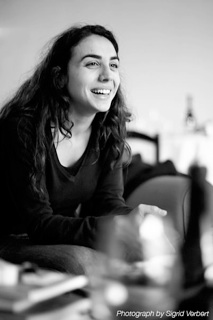Arianna Occhipinti, Sicily, Winemaker, Wine Maker, Louis / Dressner Selections, Imported by Louis/Dressner Selections, Natural Wine, Italy, Italian Wine, Vittoria, Nero d’Avola, Frappato, COS, SP68, What to drink, recommendations, Where to eat in Sicily, Wine Recommendations, Joe Dressner, Local Recs, Red Wine
Vittoria, Sicily
Arianna Occhipinti is a young winemaker from Vittoria, in the south-eastern tip of Sicily, the warm island off of Italy’s Mediterranean coast. In a region often associated with Marsala and with producing bulk quantities of full-fleshed, plummy and ripe reds made for export and blending, Arianna Occhipinti’s wines are non-conformist and highly atypical for the region.
Her wines (made from the indigenous grapes Nero d’Avola and the little-known Frappato) reflect, in part, her character: mysterious, earthy and intriguing. The wines are perfumed and spicy, with a bit of a wild streak that mirrors the rebellious energy that bubbles beneath her reserved and somewhat wary exterior.
Along with her winemaking, Arianna makes an incredible olive oil that is hard to get, and once you’ve tasted it, even harder to forget.
Q & A With Arianna Occhipinti

Q. Natural can be a vague term, used often, but its meaning isn’t always clear. As a winemaker, what does ‘natural’ mean to you?
A. In winemaking, we often hear the terms ‘organic’ and ‘biodynamic.’ Being certified as organic or biodynamic applies to the agricultural element of winemaking: the grape growing. This includes avoiding the use of chemical products, using specific treatments and fertilizers derived from plant and animal materials, favoring manual labor in the vineyards, and in the case of biodynamic farming, following the lunar cycle for the vineyard work.
However, being certified as organic or biodynamic doesn’t apply to techniques or products that the winemaker may use to transform the grapes into wine. That’s where the term ‘natural’ comes in; it means that the winemaker minimizes intervention and manipulation during the winemaking process as much as possible so that the finished product is a reflection of the terroir (the soil, location, and altitude as well as the climate and conditions of a particular vintage).
I’m actually certified organic, but I don’t bother putting it on the labels on my wines. It’s more for export purposes.
Q. What are some of the differences in the natural winemaking approach versus the conventional approach?
A. In general, the big difference is where the bulk of the work is done. In natural winemaking, since the aim is to reduce manipulation in the cellar, the grapes have to be incredibly healthy and in top shape.
That means that the work in the vineyards has to be rigorous (including careful pruning of the vines, disease prevention with natural products and methods, and protecting the diverse natural yeasts present on the grapes’ skins for fermentation). Natural winemaking reduces the element of control that a winemaker has over the finished product (which increases the element of risk in a difficult year, from a commercial standpoint).
However, with careful supervision, it can lead to a beautiful and authentic expression of the wines’ origin. Basically, though, what really matters to me in the end is whether the wine stimulates the drinker in some way. Drinking wine isn’t really a necessity; why bother drinking it if it doesn’t create energy or an emotion?
Q. Do you ever think about the consumer or the market when you’re making wine?
A. Not as a primary motivation, no. I think wine is supposed to reflect where it comes from, not where it’s going to.
I never taste previous vintages when I start the work for a new vintage. I try to stay focused on what I’ve got in front of me. Of course, I have memories of the previous years’ harvest each year when I harvest, and that contributes to my perspective of the winemaking in a longer term sense, but each year is different, and I want the wine to reflect that.
Q. Is it hard to set yourself apart from people’s perceptions of what conventional Sicilian wine is?
A. Sicily seems to be perceived as an Italian version of California or something. For me, the true expression of Nero (d’Avola) isn’t necessarily the ripe, jammy, super-concentrated fruit that people associate with it. With time, it can become extraordinarily complex and nuanced.
I also love working with Frappato (from which Arianna makes a single varietal wine, as well as blending with Nero d’Avola).
Q. Your first vintage was 2004, made when you were 21. What made you want to get into winemaking in the first place?
A. My uncle is a winemaker in Sicily (Giusto Occhipinti of the COS estate). He has been making wine since 1980. When I was 16, I accompanied him to VinItaly (the annual wine expo in Verona). It was very inspiring for me; watching the crowd milling about, meeting people, tasting, discussing the wines and asking questions.
Q. Are there any other winemakers that inspired you at that time?
A. Among others, Josko Gravner (a winemaker with a cult following who makes wines with very minimal intervention in Friuli Venezia Giulia) and Nicolas Joly (considered one of the pioneers of biodynamic winemaking, based in Savennieres in the Loire Valley).
Q. How did you learn how to make wine?
A. When I was 18, I enrolled in winemaking school in Milan.
Q. How did you end up making natural wine?
A. In school, I learned all of the technical aspects of winemaking; how to use selected yeasts in a packet to start fermentation of the grape sugars, how to use chemicals to prevent disease; in short, very conventional techniques that allow little room for the grape to express itself through the wine.
During my studies, I made friends with some natural winemakers (notably Elena from La Stoppa), and I started to question what I was being taught. I became quite vocal in the classroom (fortunately, my professors didn’t mind too much). Anyway, if you’re not going to be critical at that age, then when are you? Upon graduating, I knew that I wanted to make natural wines. I started with 1 hectare of vines, and I now have 9 hectares.
Q. Do you see eye to eye with your uncle when it comes to winemaking?
A. Definitely; he’s been an inspiration for me since the beginning. He has always worked with natural methods; understandably, he experimented with new techniques during the boom of technological advances in the ‘80s, but he quickly came back to his roots. His production is much bigger than mine; 180,000 bottles. We’re good friends and we see each other often. We share a very big passion: wine.
Q. Have you ever encountered difficulties as a woman winemaker?
A. Being a woman winemaker has its advantages and its disadvantages, and sometimes, it makes no difference. When I first started, I did run across some resistance from some of the more traditionally minded people in the trade, but now everything is fine. There’s an association in Italy called “Le Donne del Vino” (“ Women of Wine”); somebody once asked me why I didn’t belong to it. I told them that I’d join that association as soon as they create an association called “Gli Uomini del Vino” (“Men of Wine”).
Q. You also make two ‘cuvees’ of olive oil called ‘Gheta’ and ‘Pantarei.’ You even have a statement on your website says that the life of every Sicilian is tied in one way or another to olive oil?
A. My grandmother Margherita’s family (after whom the ‘Gheta’ olive oil is named), has been making oil since the 1600s. I started making olive oil at the same time that I started making wine, also using organic methods. My grandmother was a revolutionary, in a good way. The revolutionary spirit seems to skip generations; my grandmother rebelled against her mother, who was strict and controlling, and my mother’s way of rebelling against my grandmother was by being conservative.
Q. Which means that you…
A. I guess I take after my grandmother! I love making olive oil. It’s a very traditional practice, and it keeps me feeling connected to my roots.
Q. You are a bit of a tireless entrepreneur, speaking of the revolutionary spirit. What are some of your other projects?
A. I always have several ideas going at once. Getting something new off the ground and putting it into motion is one of my favorite parts of starting a project.
I have a little store with Elena (Pantaleoni) from La Stoppa where we sell local products, including wild capers that I harvest. Also, with two architect friends, I have a concept store called TAMI’ in Ortigia, Siracusa (in the southeast of Sicily); we sell natural wines, specialty food products, books, and carefully chosen artisanal and design objects.
Q. How do you have time for yourself? Do you have a lot of staff?
A. I don’t have time for myself, really. I have 2-3 employees, but I do most of the work myself. If I’m away, the cellar is closed. I work so many hours every day; once I’m finished in the vineyard or in the cellar, there’s the administrative side to attend to. I love to work, though, even if sometimes it’s to the point of exhaustion. I have to give this my all while I’m still young!
Recommendations

Q. Who are other winemakers that you admire and whose wines you drink?
A. In Sicily, I have a lot of friends who are winemakers; my uncle, obviously, as well as Frank Cornelissen, Nino Barraco, Francesco Guccione.
In Italy in general: Silvio Messana from Montesecondo and Francesca Padovani from Campi di Fonterenza (Tuscany), Dario Princic (Friuli Venezia-Giulia) are examples that come to mind.
In France: Thierry Puzelat in the Loire Valley, Marcel Lapierre in the Beaujolais, Cyril Fhal from Clos de Rouge Gorge in Roussillon.
Basically, what matters most to me the most is that the wine be an authentic expression of its provenance.
[See details.]
Q. What about food? Where do you like to eat?
A. Eating… ahhhh, my passion. To be honest, I’m so busy that I often eat at home; a quick bite in between the million things I have to do every day. There are some restaurants nearby in Ragusa Ibla (the old town sector of Ragusa) that I like to go to and where I feel at home. I think the best selection of natural wines is at La Gazza Ladra in Modica. I also really like La Locandina in Ragusa.
[See details.]
Q. Wine bars?
A. One of my favorite places to drink natural wines is Terroir, a natural wine bar in San Francisco.
[See details.]
Q. What about eating in New York? (Where Arianna is represented by natural wine importers Louis/ Dressner Selections)
A. I love Hasaki: delicious and incredibly fresh sushi and sashimi at a reasonable price. I actually have this dream of buying a two story building in New York and managing it with 25 to 30 other natural winemakers so that we always have a place to stay and connect. It could be like a little commune. I’m working on it.
[See details.]
Recommendations

Details of Arianna Occhipinti’s recommendations on where to eat and drink in New York, San Francisco, and Sicily.
WHO
Arianna Occhipinti, natural winemaker from Vittoria, Sicily.
WHY
Arianna’s wines are quickly becoming one of the natural wine world’s best worst-kept secrets.


Winemaker Arianna Occhipinti
July 27, 2010
RECOMMENDED BY
- Richard Betts, Master Sommelier and Winemaker
RECOMMENDATIONS
Arianna Occhipinti’s recommendations on where to eat and drink in New York, San Francisco, and Sicily.


Website:
Available At:
Imported By:
Interviewed By ETHELIYA HANANOVA














Share





















